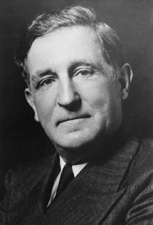Sheridan Downey
| Sheridan Downey | |
|---|---|
 |
|
|
United States Senator from California |
|
|
In office January 3, 1939 – November 30, 1950 |
|
| Preceded by | Thomas M. Storke |
| Succeeded by | Richard Nixon |
| Personal details | |
| Born |
March 11, 1884 Laramie, Wyoming |
| Died | October 25, 1961 (aged 77) San Francisco, California |
| Nationality | American |
| Political party | Democratic |
| Alma mater | University of Michigan Law School |
Sheridan Downey (March 11, 1884 – October 25, 1961) was a lawyer and a Democratic U.S. Senator from California from 1939 to 1951.
He was born in Laramie, the seat of Albany County in southern Wyoming, the son of the former Evangeline Victoria Owen and Stephen Wheeler Downey. He was educated in public schools and graduated from the University of Wyoming in Laramie in 1907, and from the University of Michigan Law School in Ann Arbor. He subsequently returned to Laramie to practice law, and in 1908 he was elected district attorney of Albany County as a Republican. In 1910 he married Helen Symons; they had five children. In 1912, Downey split Wyoming's Republican vote by heading the state's "Bull Moose" revolt in support of Theodore Roosevelt, thus leading to a Democratic victory statewide.
In 1913, Downey moved to Sacramento, California, and continued to practice law with his brother, Stephen Wheeler Downey, Jr. During his first few years in California, he devoted most of his time and energy to his law practice and various real estate interests. In 1924 he supported Robert La Follette, Sr.'s Progressive party campaign for the presidency, and in 1932 he became a Democrat and campaigned for the election of Franklin D. Roosevelt.
In October 1933, Downey announced that he was running for governor of California, but after a series of meetings with the writer Upton Sinclair, who also had designs on the governorship, Downey agreed to run for Lieutenant Governor of California as Sinclair's running mate, stumping on the End Poverty in California (EPIC) plan (opponents called the ticket "Uppie and Downey"). EPIC began as a mass movement, calling for an economic revolution to lift California out of the depression. The EPIC platform called for state support for the creation of jobs, a massive program of public works, and an extensive system of state-sponsored pensions and radical changes in the tax structure.
...
Wikipedia
